Gladys Harley
Statement #1:
City Cafe,
24 North John Street,
Liverpool.
21st January 1931.
Gladys HARLEY says:-
I am a waitress employed at the City Cafe, 24 North John Street. I reside at 37 Caird Street.
On Monday last 20th instant, it was our late chess night. I was on duty and some time after 7. p.m. I hear the telephone ring and answered the ‘phone. The operator said “Anfield is calling you”. A man’s voice then said, “Is Mr. Wallace there?” or “Mr. Wallace speaking”. He said it was something connected with the Chess Club and I said, I’ll bring the captain Mr. Beattie” and the man said, “All right”. I went to Mr. Beattie who was playing chess and he went and answered the telephone. The man who telephoned had a deep voice and spoke very quickly.
(Signed) Glayds (sic) Harley
Statement #2:
Gladys Harley of 37 Caird Street West Derby Road Liverpool Spinster will say:-
I am employed as a Waitress at the City Café, North John Street Liverpool where the Central Chess Club meets at lunch times & on the nights of Monday & Thursday in each week during the Autumn & Winter. The Club has no special room in the Café, but it is a well recognized thing for the members to use certain tables there. I wait on the members, & know a considerable number of them by sight, including Mr Wallace, Mr Caird Mr Banwell, & Mr Beattie.
Between 7 & 8 o-clock on the evening of Monday 19th January 1931, I heard the café telephone bell ringing in the telephone box, & went to answer it. I cannot be more precise about the time, but I am absolutely positive that our line had not been used by anyone for the previous half hour. The box is in full view of the part of the café where I am accustomed to be, & the ringing of the bell is clearly audible. I had not seen anyone enter or leave the box, & usually when there is a call I answer it in the first place.
When I went to the box the operator called out our number Bank 3581, & I said “Yes.” There was then a little delay & I called to the operator “Do you require this number”. She said “Yes, Anfield calling you; hold the line”. Then she asked the person at the other end to put the pennies in, & then a voice said “Is that the Central Chess Club“. I said “Yes.” The reply was “Is Mr Wallace there”. I did not recognize Mr Wallace by his name, & therefore came out & asked was he there. I then asked Mr Beattie to __ to the telephone. I did not recognize the voice on the telephone, but there was nothing strange about it. It seemed like the voice of an elderly gentleman; I am not familiar with Mr Wallace’s voice. I answer the telephone so many times a day that (?) Mr Wallace arrived about half an hour afterwards.
G. Harly.
Statement #3:
Evidence taken 19th. February 1931
GLADYS HARLEY :-
I am a Waitress employed in the City Cafe, 24.B. North John Street, Liverpool.
I live at 37 Caird Street, Liverpool.
I was on duty at the Cafe on the 19th. January Last. Sometime between 7 and 8 p.m. the telephone bell rang and I answered it. After a minute or two I heard a gentleman’s voice. In consequence of what was said I left the box to see if a customer was in. I then spoke to witness Beatty. He went to the telephone.
BY Mr. Scholefield Allen, Counsel for accused :-
I am quite sure our line was free at that time. It had been free for about half an hour. It is quite untrue that our number was engaged.
I know the accused. He is in the habit of visiting the Cafe. I did not recognise the voice on the telephone. It was an ordinary voice.
[In Margin: “Size of Café
Number of people
notice board]
Trial:
GLADYS HARLEY, SWORN. EXAMINED BY MR WALSH.
173. Is your name Gladys Harley? Yes.
174. You live at 37 Caird Street, Liverpool? Yes.
175. You are a waitress at the City Cafe, 24 North John Street? Yes.
176. Were you on duty at the Cafe on the 19th January last? Yes.
177. Did the telephone bell ring – between what time? Seven and eight.
178. Did you answer it? Yes.
179. Who answered the telephone at the other end? I could not say.
180. What kind of voice was it? Just an ordinary voice.
181. A man’s or a woman’s? A man’s.
182. In consequence of what he said, you went to see if a certain customer was in? Yes.
183. Then you spoke to Mr Beattie and he went to the telephone? Yes.
CROSS EXAMINED BY MR ROLAND OLIVER.
184. How big is this Cafe, is it a big place? Yes.
185. How many rooms are there? Four.
186. All on the ground floor? Yes.
187. And there are a lot of tables? Yes.
188. Do you have many customers? Yes.
189. Have you any idea how many people use your restaurant every day. Would it be a hundred? Yes, it would be about that.
190. A hundred? Yes.
191. I do not want to ask you a lot about the Chess Club because I will get it from somebody else, but there is a Chess Club which uses some of the tables in your room on certain days? Yes.
192. Have they got a notice posted up near the doorway of your restaurant? No.
193. You may not have noticed them, but there are some notices up, are not there? Yes, on the side.
194. Whereabouts are they? By the telephone box.
195. I beg your pardon, I said the door; I meant the telephone box. It is not far from the door? No.
196. Have you ever looked at the notices? I have at times.
197. Do they give the names of people and the dates when they are coming to play the matches? Yes.
198. So that if you looked at the list you could see if you know a man’s name on what day he was expected to come for a match? Yes.
199. MR JUSTICE WRIGHT: That is inside the Cafe and by the telephone box? Yes.
200. What sort of thing, a square frame in which you can put in and take out a name or names written on a slip or what? Names written on a board.
201. MR ROLAND OLIVER: If I were to show you a photograph of the board, you would probably know it by sight? Yes.
202. Is that a photograph of the board? (Same handed). Yes.
203. You recognise that? Yes.
204. That is the notice board, is it? Yes.
MR ROLAND OLIVER: Your Lordship would like to see it?
MR JUSTICE WRIGHT: Yes. That will be Exhibit no 52. Were the names here?
MR ROLAND OLIVER: I was going to put in a photograph of an enlargement of one of those. May respectfully suggest, I think I could do this better with a witness who is coming who will remember it.
MR JUSTICE WRIGHT: Very well, you have done enough. You can leave it for the moment.
MR ROLAND OLIVER: If your Lordship pleases.
—
Samuel Beattie
Orleans House,
Liverpool.
21st January, 1931.
Samuel BEATTIE says:-
I reside at 27 Ballantree Road, Mossley Hill. I am the manager of Messrs. George Langley & Coy, Cotton Brokers, Orleans House. I am also the Captain of the Central Chess Club, City Cafe, North John Street. The Chess Club meets every Monday and Thursday evenings. Mr. Wallace is a member of the Club.
About 7 p.m. on Monday, 19th instant, I was playing chess at the club when the waitress, Miss Harley, came to me and said, “Is Mr. Wallace here? There is somebody on the telephone asking for Mr. Wallace. Will you go and take the message for him. I don’t know what he is talking about”.
I went to the ‘phone and a man’s voice – a gruffish voice but of a man sure of himself, a strong voiced man – enquired for Mr. Wallace and asked would he be there. I told him I could not say. He then asked, “Can you give me his address?” I said, “I am afraid I can not”. He then asked, “Will you be sure to see him?” and I replied that I did not know. He then asked if I could get in touch with him as it was a matter of importance to Mr. Wallace. I again told him I was not sure and he then said that he was busy and did not know if he could get him. He said it was his daughter’s 21st birthday and he wanted to do something for her which would be in the nature of business for Mr. Wallace. I then said that if I could not get Mr. Wallace himself I could possibly get in touch with him through a friend.
He then said, “Will you ask him to call on me to-morrow night?. You had better take my address” I told him I was standing at the telephone and would take it. He gave me the name, “R.M. Qaltrough”. I wrote it down and spelt it back to him, and the address 25 Menlove Gardens, East, Mossley Hill. I also wrote the address down and repeated it to him. Mr. Wallace was not then in the Club and I went back to my game.
About a quarter of an hour later, it would then be about 7.30 p.m. a Caird (the friend of Mr. Wallace I had in mind) came along and said “Good evening” to me. I asked him would he be seeing Mr. Wallace that night because I had a message for him. He said, “Mr. Wallace is here” and I said, “I’ll go and speak to him”. Mr. Wallace had started a game at another table and I went to him and gave him the message. Mr. Wallace said, “Qualtrough, Qualtrough, I don’t know anybody of that name. Where does he say he lives”. I don’t gave him the address and he said, “I don’t know Menlove Gardens East. I don’t know him”. He then said, “I don’t know where it is. Menlove Avenue?” I corrected him and said it was Menlove Gardens and I tried to tell him where it was. I enquired of another member whether Menlove Gardens East ran off Menlove Avenue and told Mr. Wallace it was it was somewhere about Menlove Avenue I told him the message said it was something about business although at the time I did not know what Mr. Wallace’s business was.
(Signed) S. Beattie.
C.I.D. Special Branch.
24th January 1931.
Samuel BEATTIE says:-(further statement)
I have thought over the matter of the receipty of the telephone message from Mr. Qualtrough for Mr. Wallace on Monday, 19th instant, and as near as I can estimate it it would be shortly after 7 p.m. I did not have occasion to look at the time and it may have been a little later.
On Thursday night, 22nd instant, I was at the Chess Club meeting, City Cafe, North John Street. At 10.20 p.m. I left the cafe in company with Mr. Caird and Mr. Barouch. We walked along towards the car stop at the corner of North John Street and Lord Street. Mr. Caird was slightly in front of me with another club member and I was following behind talking with Mr. Barouch. Just as I got to the corner Mr. Caird turned round and said to me:- “Mr. Beattie see who’s here?” and I saw Mr. Wallace standing on the edge of the curb, right on the corner, with his back towards Lord Street. Mr. Caird then spoke to Mr. Wallace and Mr. Barouch and I also joined in. Mr. Wallace looked at me and said:- “That telephone message, can you remember what time you actually received that message. It may be very important.” I said:- “About 7 o’clock”. He said:-“That’s not near enough for me” or “I’d like to get nearer than that if you can remember“. I replied:- “I’m afraid I can’t”.
He then said there were a lot of strange things in connection with the murder, but the Police had cleared him as he had just left their office. I said:- “Oh, have they?” and he said:- “Yes they’ve cleared me”. He then commenced to discuss the case by saying that there were strange features about it and that he hoped they would catch the man and that he would like to meet him as there were some things he would like to ask him.
I said:- “You know the Police have been in touch with me over this business and I would advise you not to discuss it with anyone other than the Police because any simply (sic) thing you might say might be disroted”. He said he knew or h[fades out]
He mentioned that he was catching the car there, the No.8 or No. 5 car, he thought either of them would do, as he was going to sleep at Ullet Road. He said, referring to the Police, “They won’t let me go home tonight” although in answer to my question he said he had slept at home the previous night. I advised him to get a No. 15 car but he said a No. 8 was nearer, as No. 15 was at the top of the road. He Caird then asked when the funeral was and he said he did not know but he was trying for Saturday. A No. 8 car then came up and he got on it. None of the Chess Club members went with him on the car. It was 10.25 p.m. when I boarded my car just after Mr. Wallace had got on his car.
As regards my previous statement that it was about 7.30 p.m. Monday, 19th instant when I saw Mr. Wallace at the Club, I have since made enquiries and thought the matter over and I can now say he was not in the Club earlier thatn 7.45 p.m. on Monday, 19th instant.
(signed) S. Beattie.
Munro Files:
I was at the City Cafe North John St, Liverpool on the evening of Jan 19th 1931 (Monday) When a waitress, Miss Harley, came to me & asked me if I knew whether Mr Wallace was in the cafe or not; she did not know him well enough to be definite on the point. She said someone was on the phone asking for him * asked me to answer him. I consented, looked around the room * found that Wallace was not there.
This was about 7 pm or shortly after. I then went to the phone when the following conversation took place, as near as memory serves.
“Is Mr Wallace there”
“No”
“But he will be there”
“I can’t say, he may or may not, if he is coming he will be here shortly. I suggest you ring up later.”
“Oh no, I can’t I am too busy. I have my girl’s 21st birthday on & I want to do something for her in the way of his business. I want to see him particularly. Will you ask him to call around to my place tomorrow evening at 7.30.”
“I will if I see him, but he may not be here tonight, however there is a friend of his perhaps you ^know him, ‘Mr Caird,’ who is fairly certain to be here tonight & I will try to get the message delivered through him, but I can’t promise that Mr Wallace will get the message; but you had better give me your address again so that I can pass it on.”
He then gave the following address which I took down at the phone, repeating it back to him,
R.M.Qualtrough, 25 Menlove Gardens East, Mossley Hill.
He then rang off.
The voice of the man was strong & gruff, ready of utterance (?), confident, definite in knowing what he wanted to say; ____.
The time I received the message was about 7 to 7.10 pm.
Wallace had not arrived so I resumed a game I had been interrupted in playing.
Later on, Caird came over & said “good evening” I asked him could he give Wallace a message.” He replied “Wallace is here” at that, I went along to Wallace who had arrived unnoticed by me & was playing a game with McCartney. This must have been about 7.50 for I understood that Wallace arrived at 7.45 or thereabouts.
I gave my message to Wallace whos aid “Qualtrough, Qualtrough, who is Qualtrough, I dont know him” To which I replied “Well if you don’t him sure I don’t know him but he said it was business.” He then took note of the address & seemed to remain rather undecided or not as to whether he would bother about it further. However as he did not seem to know much about the district I asked a member of the club if he knew definitely where Menlove Gardens East were in order to save Wallace, a stranger, ___ hunting in in the dark. This friend however did not know + consequntly I told Wallace we could not help him as its whereabouts & finished the conversation at that.
Trial:
SAMUEL BEATTIE SWORN. EXAMINED BY MR HEMMERDE.
205. Your name is Samuel Beattie? Yes.
206. Are you a cotton broker’s manager? Yes.
207. You live at Goswell, 27, Ballantree Road, Mossley Hill, Liverpool? Yes.
208. Are you a member of a Chess Club which meets at the City Cafe, North John Street? Yes.
209. Is that called the Liverpool Central Chess Club? Yes.
210. I think you are the captain of the Club? Yes.
211. During the winter, does the Club meet two evenings a week? Yes, Mondays and Thursdays.
212. How long have you known the accused? About 8 years, I should say.
213. Was he in the habit of attending on one or both of those days? He was not what we call a regular attender. We may say most likely one, sometimes two. If there was, a match on he might come two nights a week.
214. Do you know whether he had been there recently before January 20th? I should not think so, but I do not know definitely, because we break up for the Christmas recess and then the members after Christmas are uncertain as to when they resume playing operations.
215. MR JUSTICE WRIGHT: You do not think he had been there since when? The last I had seen of him was before Christmas.
216. Do you know him? As captain, I am supposed to be there almost continually.
217. MR HEMMERDE: Your are there continually? Quite, in the evenings.
218. Is one able to tell from looking at the board, a photograph of which I have here, exactly when people will be there? No. It is when they are scheduled to be there, but it does not follow that they will be there; they should be there.
219. On the board would appear when they ought to be there? Quite.
220. What time in the evening does it meet generally? It is an Open Cafe and play must commence, the match games, by a quarter to 8, but they can commence earlier if they arrange to do so.
221. On the 19th of January what time, did you get to the Cafe? About 6 o’clock.
222. Sometime later, do you remember the waitress, a Miss Harley, speaking to you? Yes.
223. Did you go to the telephone? I did.
224. MR JUSTICE WRIGHT: About what time was that? Seven or shortly after seven.
225. You took no notice of the time? No my Lord.
226. It was shortly after 7? Yes my lord.
227. MR HEMMERDE: Having gone there did you hear someone speaking? I did.
228. A man or a woman? A man.
229. What sort of voice? A strong voice, a rather gruff voice.
230. Did you take a message from the person? I did.
231. Rather later, did you see the accused in the Cafe? I did.
232. About what time was that? About half an hour after I had received the message, say a quarter to 8.
233. Had you seen him come in? I had not.
234. When you saw him, what was he doing? He had commenced to play a game with an opponent named McCartney.
235. Did you speak to him? Yes.
236. What did you say to him? I said: “Oh, Mr Wallace, I have a message for you”.
237. Did you tell him where the message came from? Yes. “I have a message for you”. He said: “Oh, who from?” I said: “From a man names Qualtrough”, and he said: “Qualtrough, Qualtrough, who is Qualtrough”?
238. Did you tell him how the message had come? Yes, by ‘phone; it was a telephone message.
239. Did you spell that name? No, I cannot quite say that I spelt the name to him, but I gave it to him written down on an envelope on which I had taken it. I had taken particulars at the ‘phone.
240. You had taken it down as R M Qualtrough, 25 Menlove Gardens East, Mossley Hill? Yes, quite.
241. Is that the envelope? (Same handed). Yes, that is my writing.
MR JUSTICE WRIGHT: Is that an Exhibit?
MR HEMMERDE: No, my Lord, it is not, but there is no real point in it.
MR JUSTICE WRIGHT: It had better be made an Exhibit.
MR HEMMERDE: Yes, my Lord that will be Exhibit no 53.
242. So he said: “Qualtrough, Qualtrough, who is he”? Yes.
243. What did you say? I said, “Well, if you do not know who he is, I do not”.
244. Did you tell him what Mr Qualtrough wanted? Yes, I said: “Mr Qualtrough said that he wished to see you tomorrow evening at 7.30”, and I told him the address: “25 Menlove Gardens East. He says it is something in the nature of your business”.
245. When you said that, what did he say? He said: “I don’t know the chap. Where is Menlove Gardens, East? Is it Menlove Avenue”? I said: “No, Menlove Gardens, East”. Then he asked: “Where is Menlove Gardens, East”?
246. What else did he say about that? He did not know where the place was, Menlove Gardens, East, so I said: “Wait a moment, I will see whether” and I mentioned the name of another member “knows where Menlove Gardens, East is”.
247. Who was it you were to ask? A man named Deyes, another member of the Club. I said: “I will see whether Deyes knows where it is. I know that one comes into, Menlove Avenue and the other one, I think, goes into Queen’s Drive and it is an awkward place to be knocking about in the dark to look for. I will just see whether Deyes knows where Menlove Gardens East is”.
248. You knew roughly, where it was? I knew Menlove Avenue, East.
249. When you told him, it was a bad place to be knocking about in the dark and so on what did he say? He said: “I belong to Liverpool. I can find out or I have a tongue in my head”, or words to that effect.
250. Was anything said as to the route he should take? Yes, I told him that a car to Penny Lane would be the best way, but first of all get the location and then to enquire, and I think it was at that stage where he said he had a tongue in his head and could enquire.
251. So far as you were concerned, that is all you saw of him that evening? Quite.
252. Did you actually see him make the entry in his diary as to the address? He did write the address down.
253. But did you not notice more? I did not notice more.
254. Did you see him again on the 22 January, two or three days later? Yes.
255. Were you just leaving the Cafe? Yes, I was leaving the Club and was going to catch my car at the corner of Lord Street.
256. What time? About 10.20 at night after the Club was over.
257. Did you speak to him? My attention was drawn to the fact that he was there by a man named Caird who said: “Mr Beattie, he is here” and I saw him standing there.
258. What did he say to you?
259. MR JUSTICE WRIGHT: You went to him, I suppose? Yes, we recognised one another and then he said: “Oh, that telephone message, can you remember definitely what time you actually received that message?” I said: “Well, 7 or shortly after”. His reply was: “Cannot you get a bit nearer than that?” I said: and he said: “Well, it is important to me and I should like to know if you can get nearer to it than that”, and I said: “I am sorry, I could not”.
260. MR JUSTICE WRIGHT: He said what? Could I be more definite over the time? I said: “Seven or shortly after”.
MR HEMMERDE: Did your Lordship get it? He said: “It is important to me”.
261. MR JUSTICE WRIGHT: No, I did not get that. He said: “Could I get nearer the time”? Yes, could I be more definite.
262. What else did he say? “It is important to me to know what time you did receive the message”.
263. MR HEMMERDE: After you said you could not help him there, what did he say next? Did he say where he had come from? Yes, he said he had just left the police. In the course of the conversation, he said: “I have just left the police; they have cleared me”.
264. What did you say to that? I said: “I am very pleased to hear it, very pleased”.
CROSS EXAMINED BY MR ROLAND OLIVER.
265. First of all, with regard to the Club notice board, do you recognise that as a photograph of the notice that was on the board during January this year? (Same handed). Oh, yes
266. That is right? Yes, it is quite authentic.
MR JUSTICE WRIGHT: What part of January?
MR ROLAND OLIVER: It is a notice for November, December, January and February, but it includes the month of January, and I will hand a copy up to your Lordship and have copies for the jury. Perhaps the jury could compare them.
MR JUSTICE WRIGHT: This must be made an Exhibit.
MR HEMMERDE: Yes, that will be Exhibit no 54, my Lord.
MR JUSTICE WRIGHT: This is an enlarged photograph?
MR ROLAND OLIVER: Yes, of one of the notices.
267. Was your Chess Club divided into classes, class 1 and class 2 and was there a third? Yes.
268. Was Mr Wallace in class 2? That was his class; I believe it is his class. Yes, that is the second-class championship.
269. Was this a notice concerning the second-class championship that was going on during those months? Yes.
270. I find Mr McCartney and Mr Wallace were both in it and a Mr Chandler. Yes.
271. According to this, was not Mr Wallace posted on that board as being due to appear on January 19th? Yes.
272. What does the cross mean opposite the name? Does that mean he is not expected? No, that is a blank date. When there is an odd number of players, there is a blank date on which he does not play.
273. So far as the notice is concerned, for the month of December, he was not due to appear after the 15th, but he was due to appear on the 5th January and again on the 19th? Yes.
274. Any person using the Cafe who was interested in that information could see it? Yes.
275. This board is quite near the door, is it not? Yes, quite public.
276. Plain for anybody who comes to the Cafe to see it? Yes, it is plain for the ordinary customer to see it.
277. You say it is a Club rule that you have got to start your match by a quarter to 8? Yes, that is the Club rule.
278. What time are you supposed to start, at half past 7? No, not later than a quarter to 8. They might start earlier than that by arrangement but you cannot penalise anyone if they do not start before a quarter to 8.
279. That is good enough for me. You have got to start at a quarter to 8 you might start earlier? Yes.
280. I am interested in the voice that addressed you on the telephone on this particular evening. How much conversation did you have with it? Could you reproduce the conversation for us do you think? Yes, partly. I can give you an idea of the conversation.
281. The part I am interested in particularly is the part in which the voice told you about the business, whatever it was. Can you remember what the voice said about that? Yes. I told him that Mr Wallace was coming to the Club that night and he would be there shortly, would he ring up again. He said: “No, I am too busy; I have got my girl’s 21st birthday party on and I want to see Mr Wallace on a matter of business; it is something in the nature of his business”.
282. Something in the nature of his business coupled with a reference to his daughter? That was the reason he was not able to ‘phone Mr Wallace himself later that night because he was too busy with is girl’s 21st birthday.
283. In addition to that, conversation, I suppose he spelt for you the name Qualtrough? Yes, at my request.
284. And gave you the address? Yes.
285. And you had altogether quite a conversation with the voice? Yes, I should say so.
286. You used an expression in your evidence at the Police Court about the voice which you have not used today. You said a strong and gruff voice today? Yes.
287. At the Police Court, you said it was a confident and strong voice. That means it was not a hesitating voice in answer to some question.
288. MR JUSTICE WRIGHT: You used the words “It was a confident voice”? Yes, in answer to a question it was a confident voice, sure of himself.
MR JUSTICE WRIGHT: You never know what the question was in the Court below?
MR ROLAND OLIVER: No, my Lord.
289. MR JUSTICE WRIGHT: He says he was asked the question and he said it was a strong confident voice. (To the witness). Did you use strong confident as well? Yes.
MR ROLAND OLIVER: Yes, strong confident voice.
MR JUSTICE WRIGHT: You missed out “strong” just now.
290. MR ROLAND OLIVER: Was it a hesitating voice that seemed to speak with difficulty? No.
291. So far as you can judge, was it a natural voice? That is difficult to judge.
292. I know it is, but did it occur to you it was not a natural voice at the time? No, I had no reason for thinking that.
293. Do you know Mr Wallace’s voice well? Yes.
294. Did it occur to you it was anything like his voice? Certainly not.
295. Does it occur to you now it was anything like his voice? It would be a great stretch of the imagination for me to say it was anything like that.
296. With regard to the conversation in the Chess Club when you went to give this message to Mr Wallace, I do not want to ask you for the whole of it because most of it we agree. Did Mr Wallace ever suggest to you that he did not know Menlove Avenue? No.
297. Menlove Gardens might be anywhere along Menlove Avenue, I suppose, to a man who did not know where it was? Quite so.
298. Do you know Menlove Avenue well? Yes.
299. We are told it is several miles long. Is that right? Yes, it is 2 to 3 miles long I should say.
300. I want to know what id demeanour was when you gave him this messaged in the Chess Club. First of all, was he playing a game of chess? Yes.
301. Did he appear to be interested in his game? Yes, he was just thinking out the opening move.
302. He did appear to be interested in it. I think you said absorbed in it at the Police Court? I had to attract his attention.
303. As a fact, the game lasted till 10 minutes past 10 that night? I understand so, I am told so.
304. Do you know whether he went out? Yes, he did.
305. You did not see him leave? Oh, no.
306. If it is right that the game went on to 10 past 10 it would mean he had a struggle for something like 2 and a half hours and then won? Yes, quite.
307. With regard to the consultation with Mr Deyes as to where Menlove Avenue was, was that a thing you volunteered to do yourself or was it a thing he asked you to do? No. I did it quite by myself.
308. There is only one other thing I want to ask you. With regard to the conversation you have spoken of on the evening of the 22nd January in Lord Street, when he came and spoke to you, which I do not differ from; but do you remember saying anything of this sort to him (in order that I might remind the jury) when you say he was asking you, pressing you if you could remember the time when you got the telephone message saying it was important to him, did you say anything of this sort to him: “Now, Mr Wallace, do not say anything about his trouble as anything you say might be misconstrued”. Mr Wallace told me that the police had cleared him. I said: “I am very pleased to hear it”, and I said if you take my advice you won’t discuss the case any further because it is quite possible that a simple thing you say may be misconstrued.
309. The substance of what I put to you is true? Yes, quite.
310. You do not know how long he had business with the police on the 21st or 22nd? Oh, no.
311. From your method of addressing him on this occasion, it looks as if people had suspected him. Do you know, had there been rumours about him when his wife was found killed? He was saying to you he had been cleared by the police and you were saying you were pleased to hear it and so on, and then you told him not to talk about it because what he said might be misconstrued. It was only the working of my own mind having mixed with the general public and having heard varying expressions of opinion.
312. You had mixed with the general public and you had heard varying expressions of opinion? Yes.
RE-EXAMINED BY MR HEMMERDE.
313. Can you tell me what these figures mean on this, second-class championship fixture? Why is there a different figure against each of these people? You notice it is allotted out and there are dates and each player is given a number and his number then is placed in a date against another opponent. If you look down the first column, you will see that No 7 appears opposite No 2 and conversely No 2 appears against No 7 meaning that they must meet on that date.
314. MR JUSTICE WRIGHT: Does that mean on the 19th January, No 6, that is the prisoner, would be meeting No 1, that is Mr Chandler? Is that it? Yes, my Lord.
315. Is that why you have got no 1 in the column over January 19th opposite the prisoner’s name? Yes, quite. That was the arrangement of the schedule when we drew it up.
316. I asked the simple question, does that mean that he was playing with Mr Chandler that night? Yes. According to our arrangement, he should have played with Mr Chandler that night.
317. And he was playing with Mr McCartney? Yes.
318. That was no 4? Yes, my Lord.
319. MR HEMMERDE: You often find a number of these people do not turn up, I suppose? Yes. They do not turn up and the dates have to be rearranged.
MR ROLAND OLIVER: He ought, according to the list, have played Mr McCartney on the 24th November and apparently, he had not, and this was a play-off because Mr Chandler was not there.
MR JUSTICE WRIGHT: Yes, it is obvious it is subject to variation. (To the witness). This was prepared somewhere in November.
THE WITNESS: In October, my Lord.

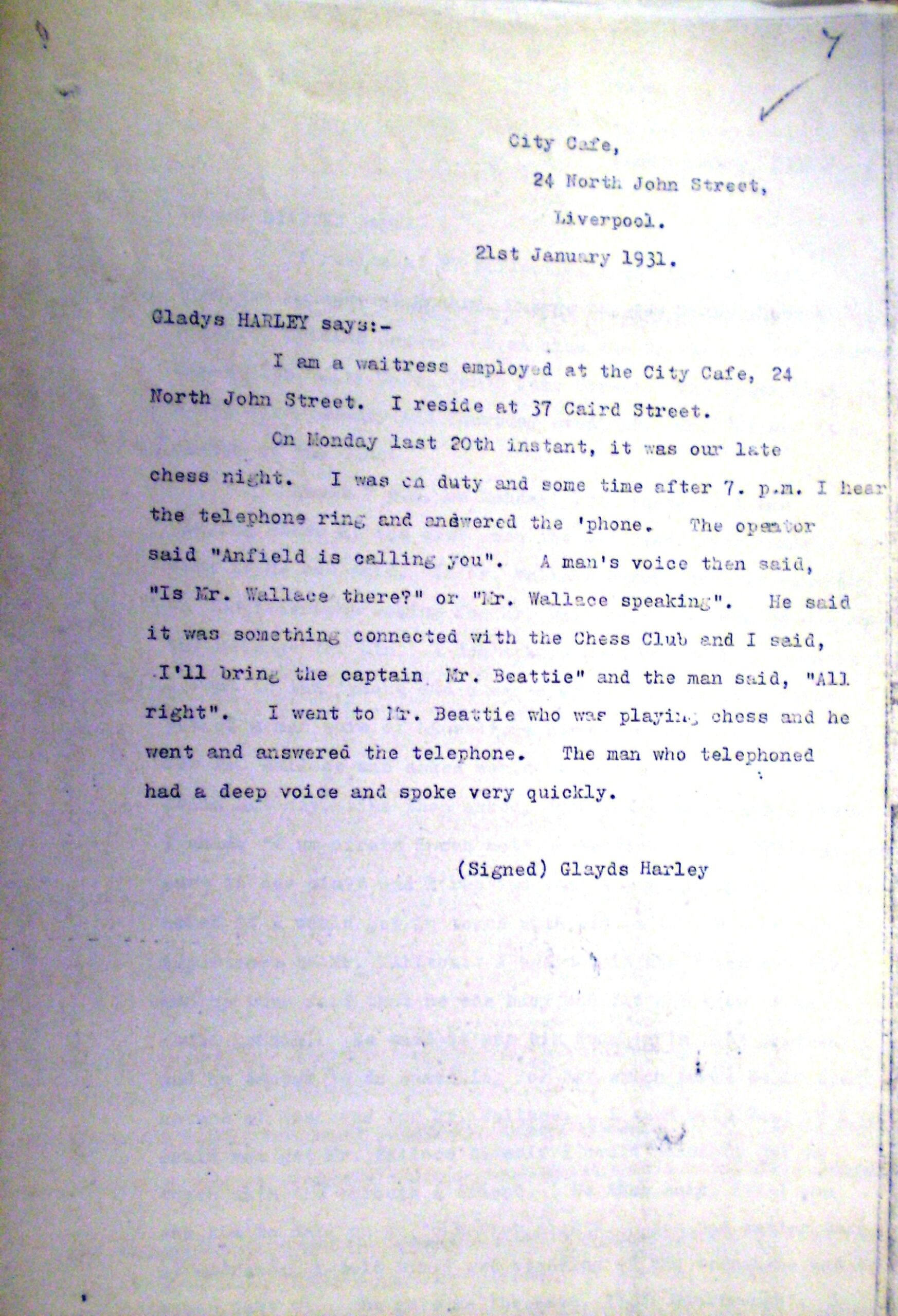
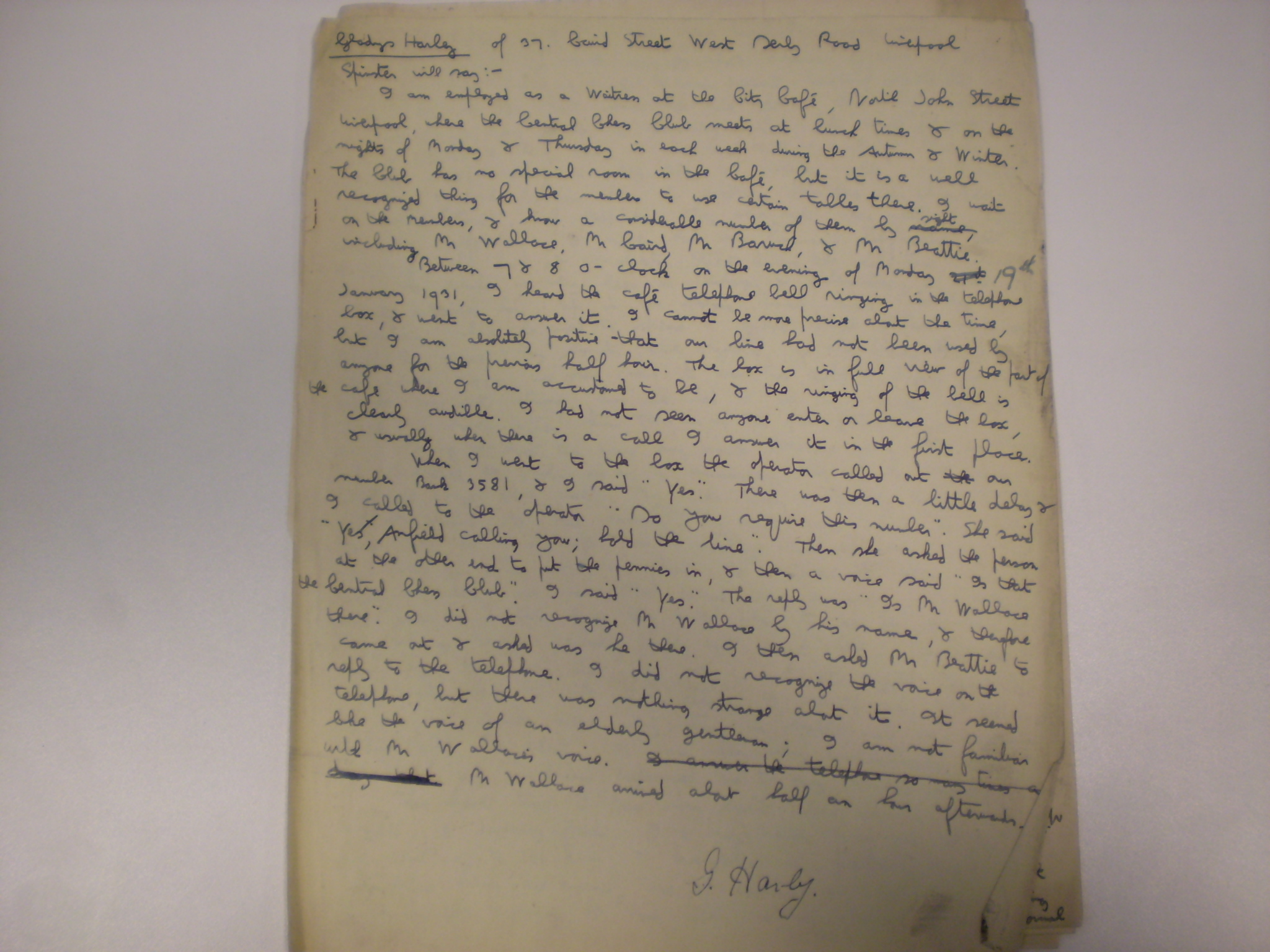
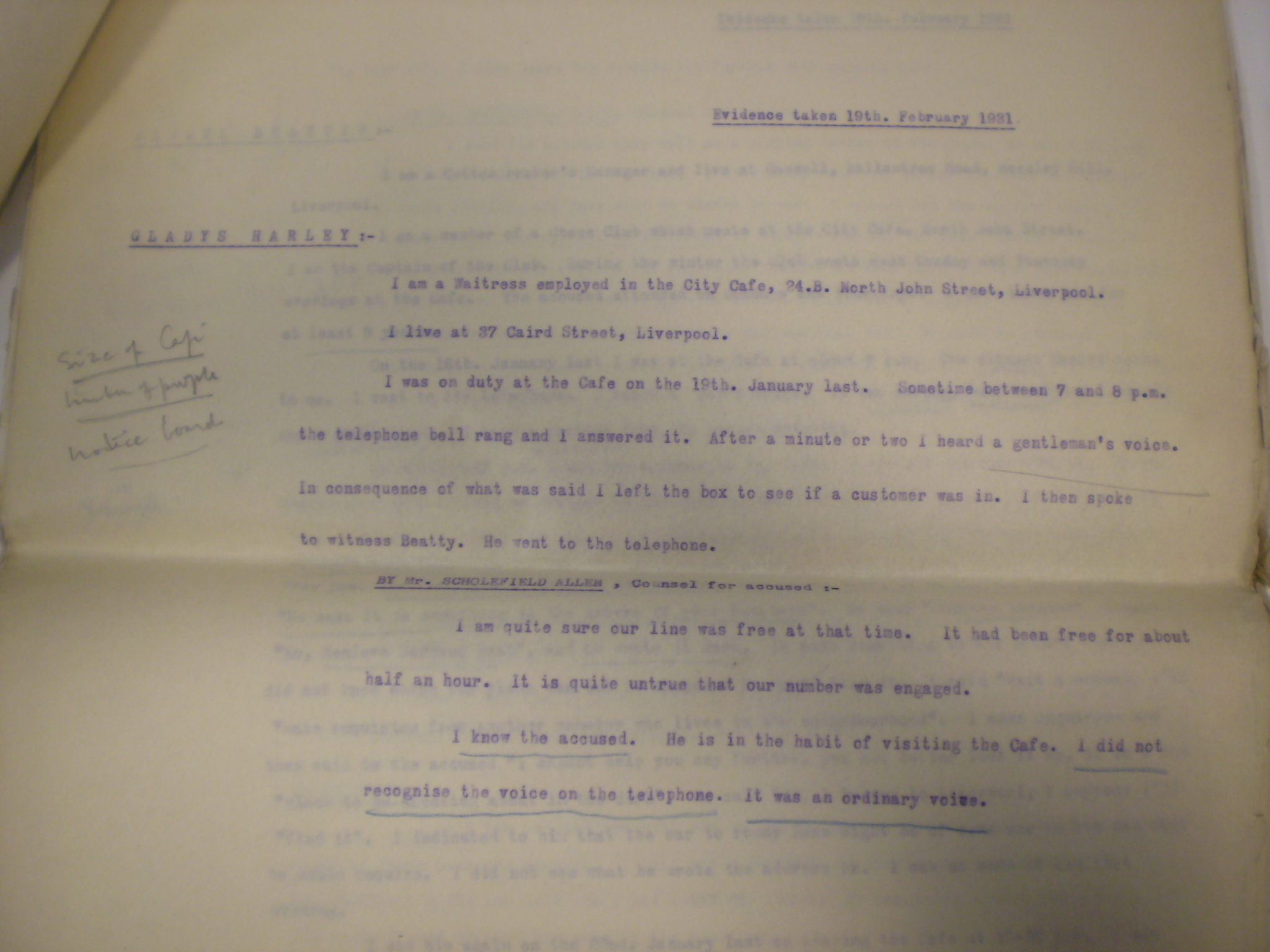
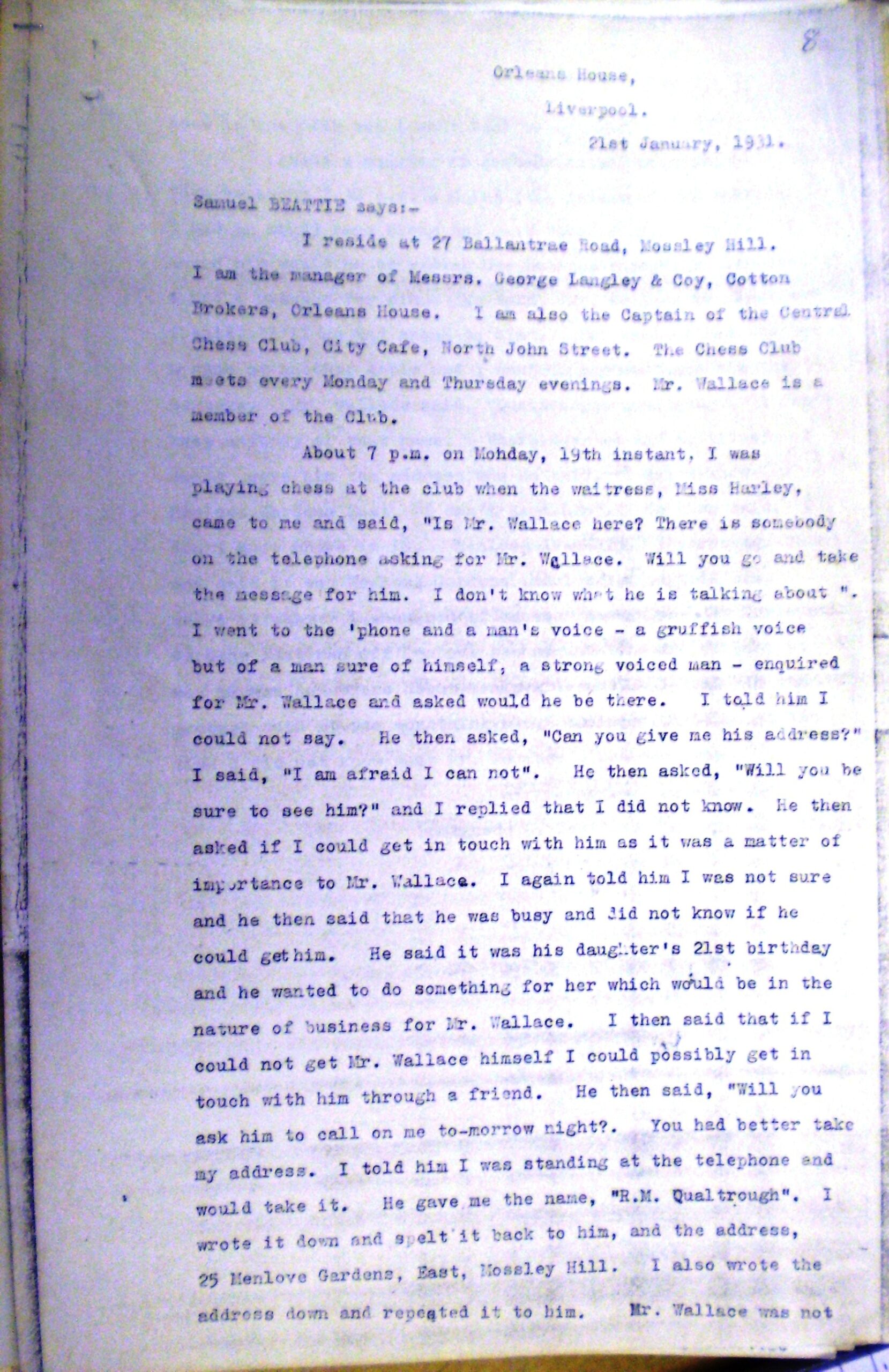
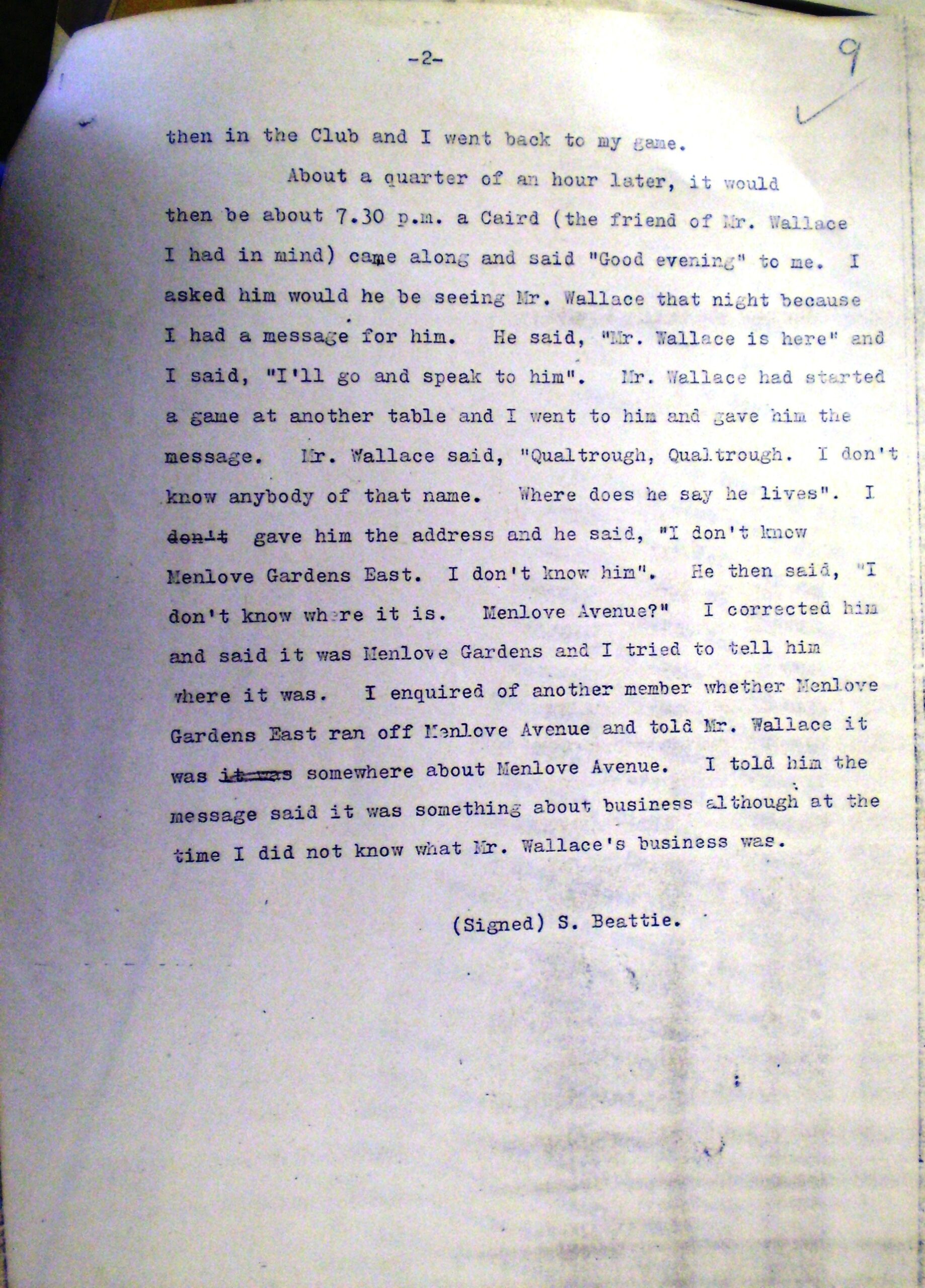
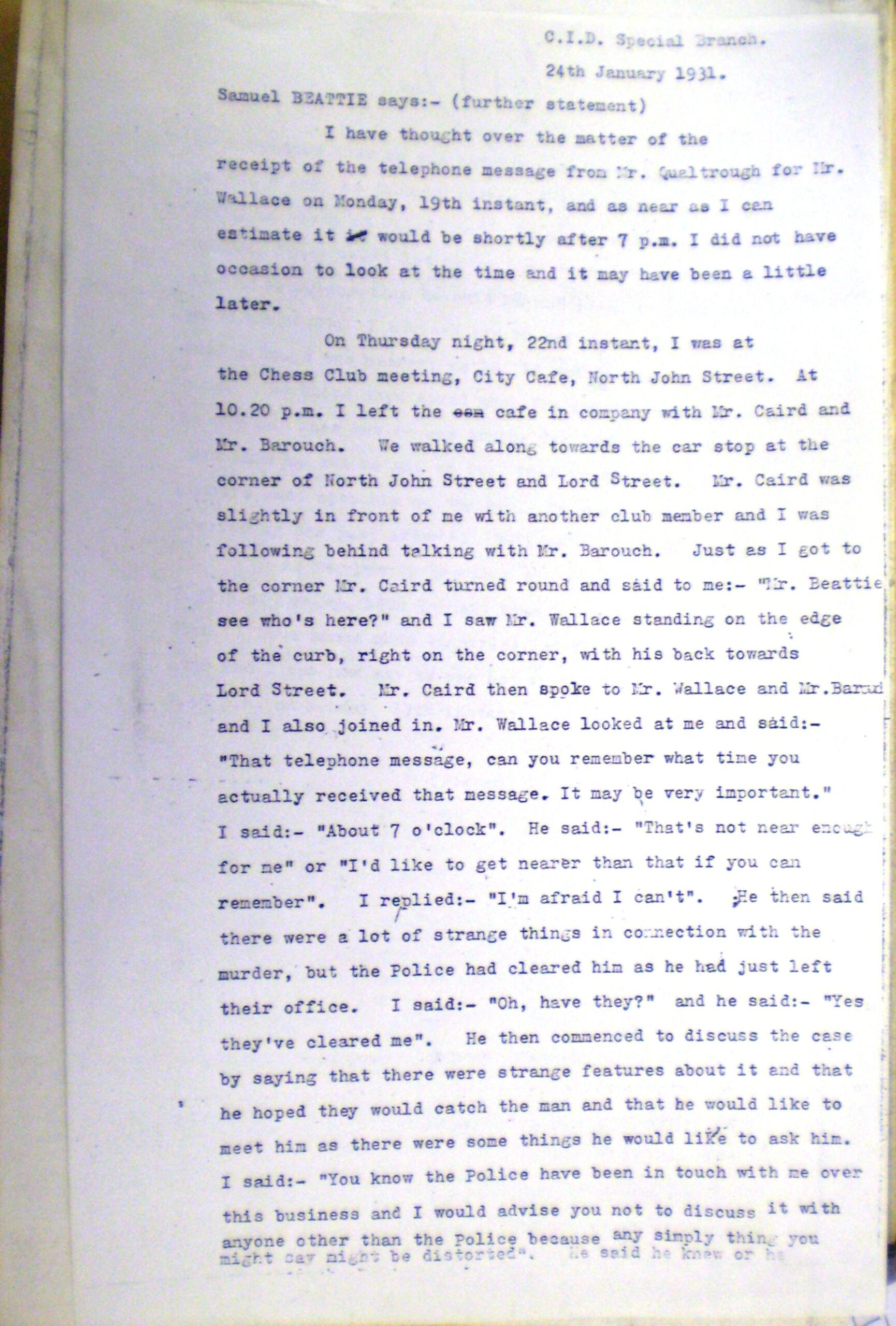
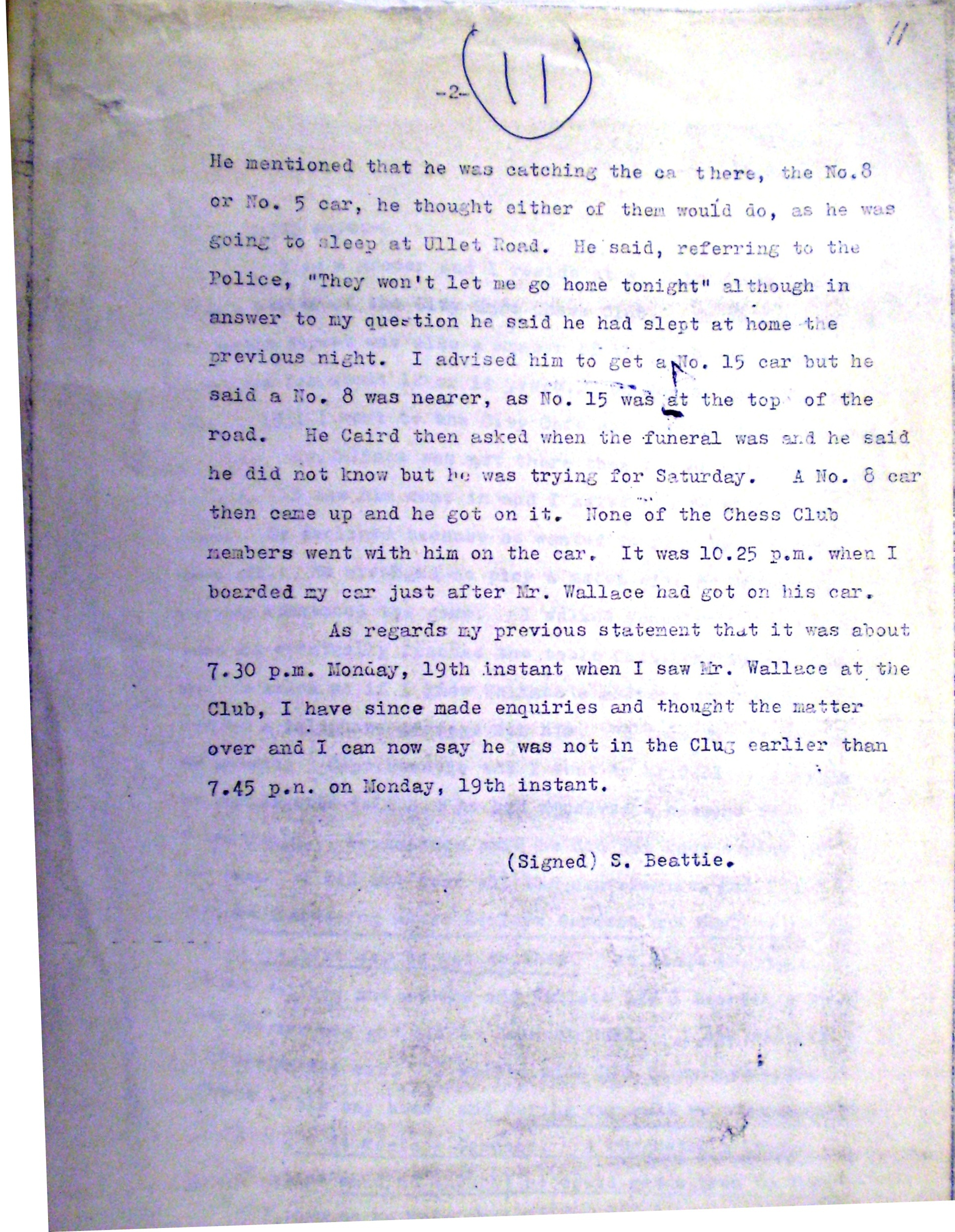
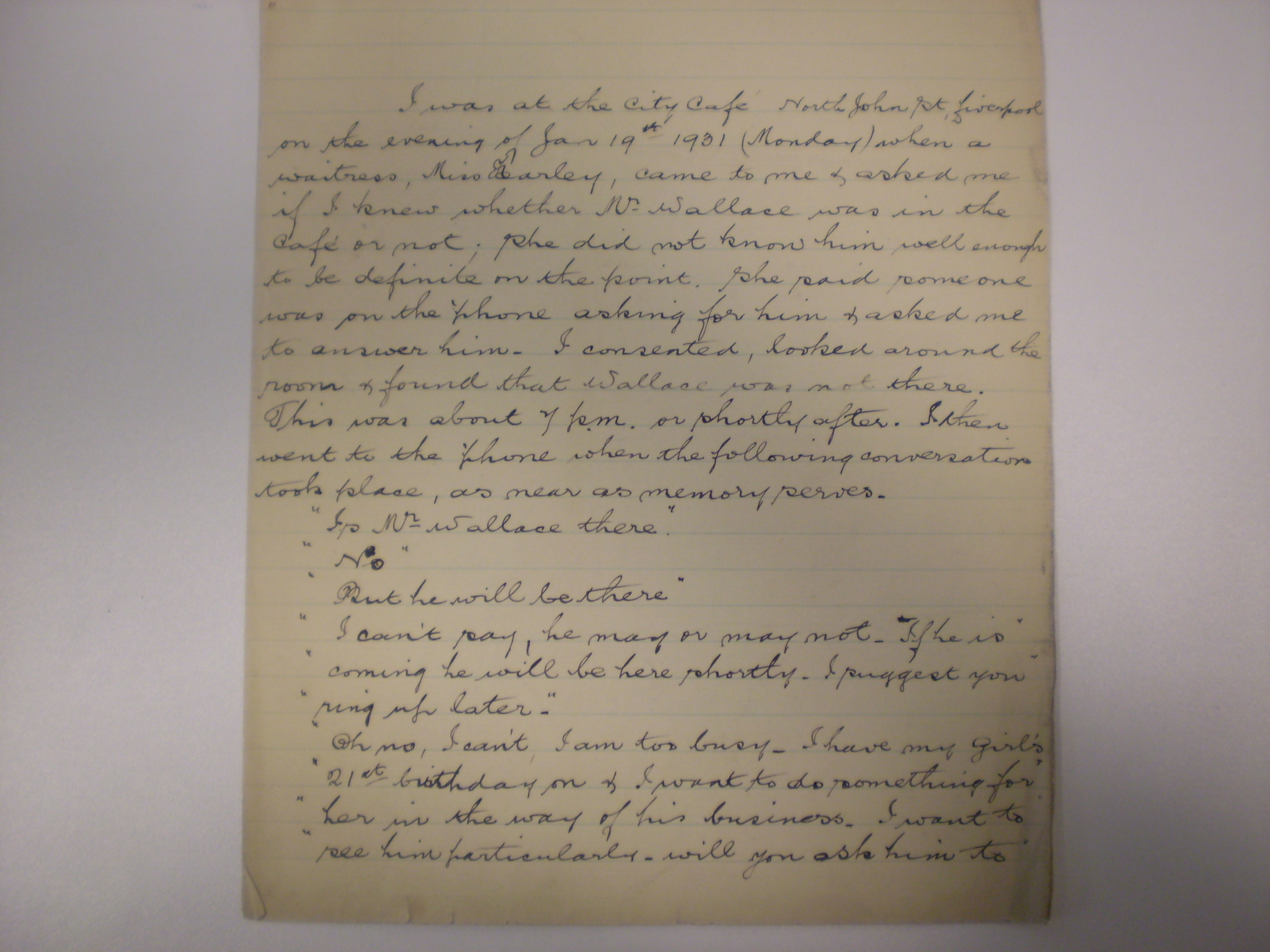
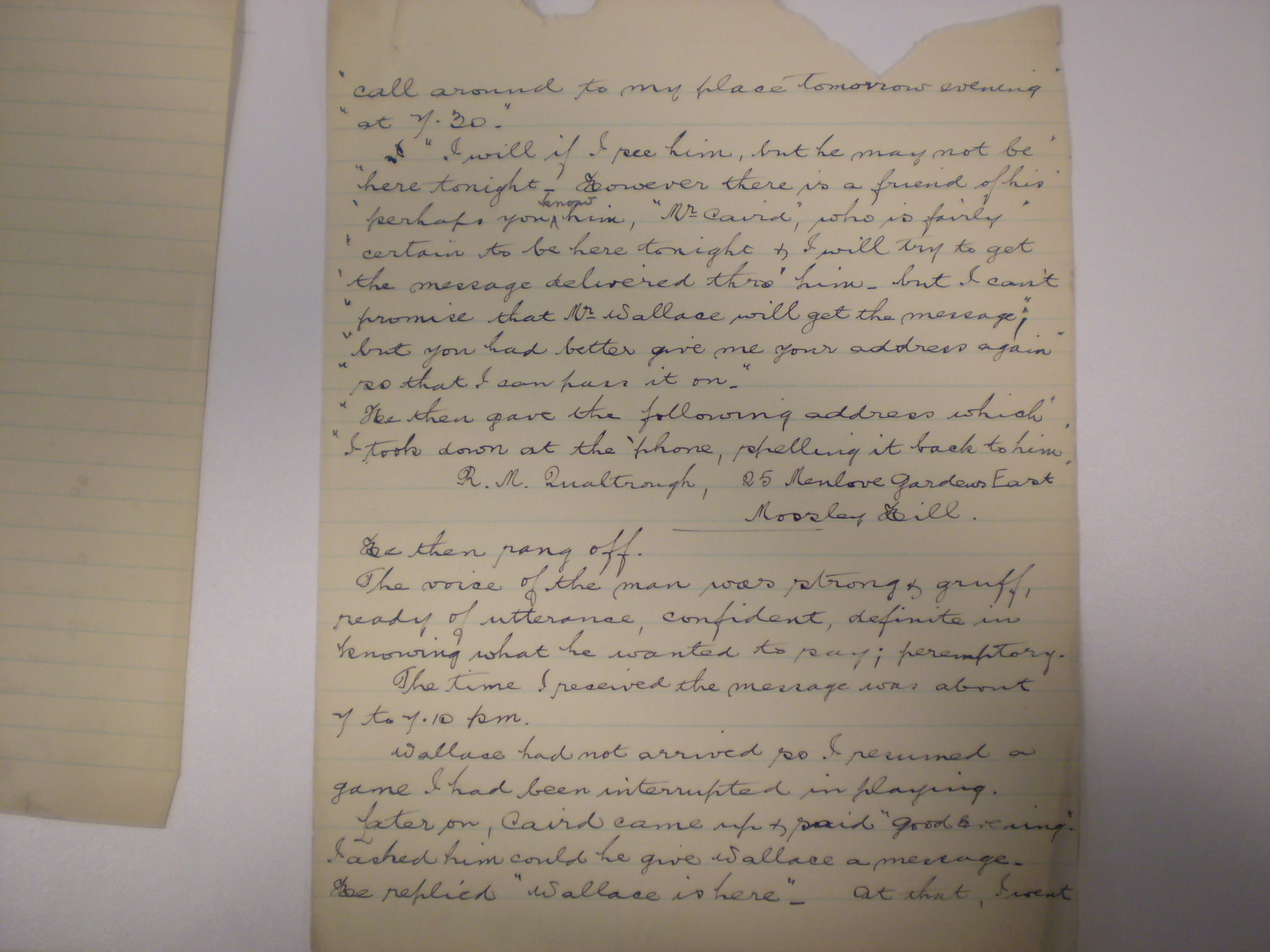
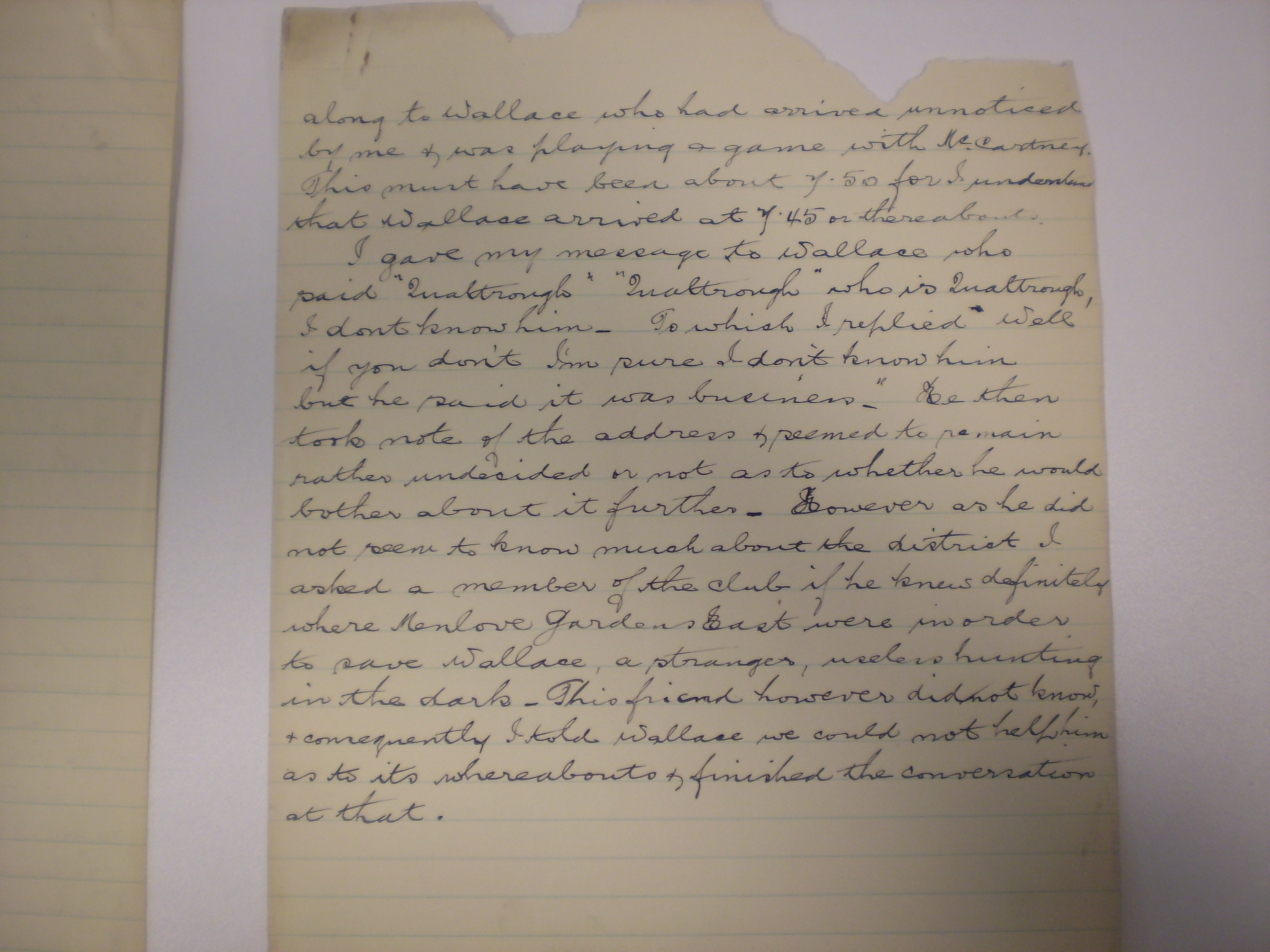
what year did samuel beattie die i cant see much about him in any of the books